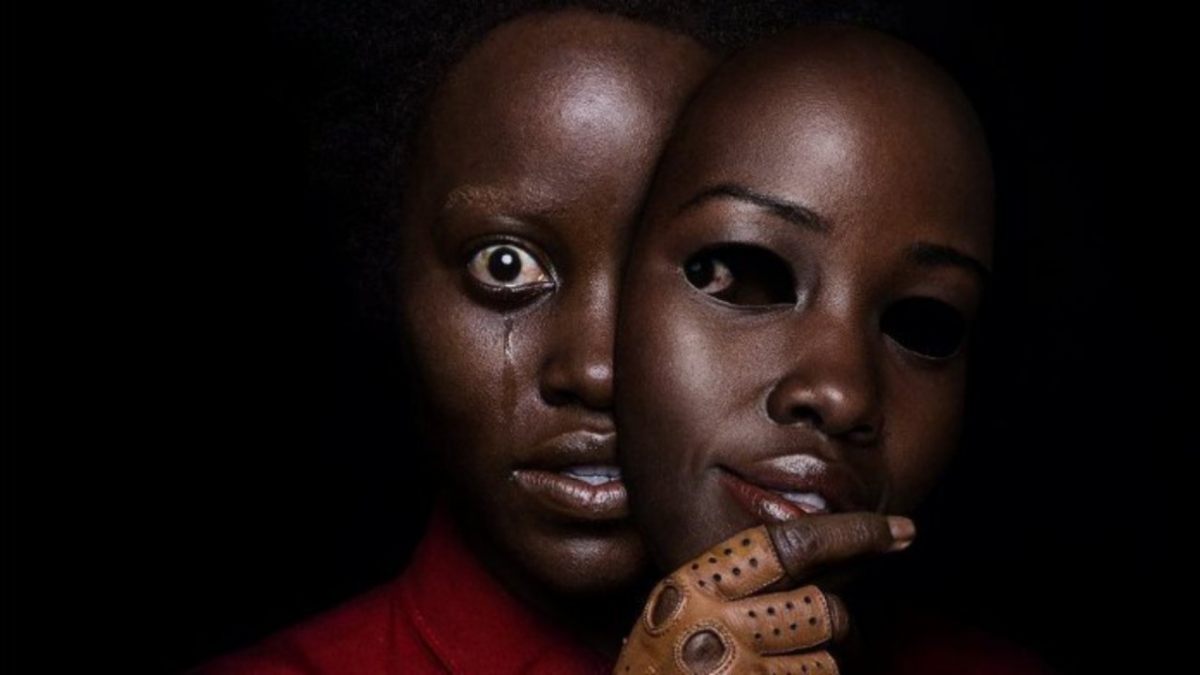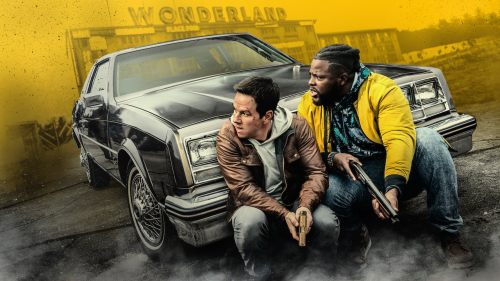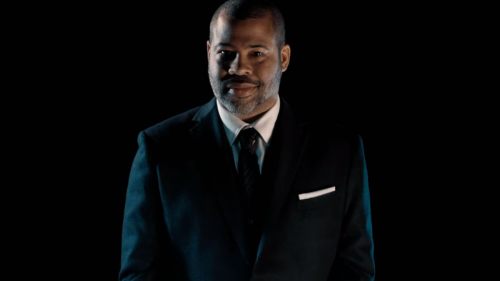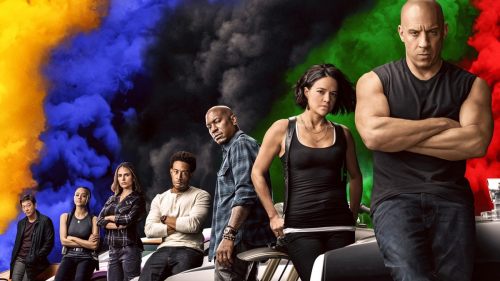Extra, Extra: Jordan Peele’s US
As sales of physical discs (Blu-ray and DVD) decline, the idea of bonus features becomes less and less essential for new, mainstream films. There will always be a market for library titles with extensive retrospective commentaries and documentaries (see: Criterion, Scream Factory, etc), but for new films it's a dying trend. "Extra, Extra" is an attempt to encourage the studios not to give up on us disc champions, by mostly skipping over the film itself (which by now most have seen and you can find reviews for anywhere) and focusing on the bonus features they were kind enough to include. Viva la physical media!
The back of the Us blu-ray has a blurb that touts "The best horror film of all time" *, which will certainly set some high expectations for a viewer who a) didn't already see it and b) is the sort of person who will buy or rent a Blu-ray on account of the critical praise plastered all over it (at least they didn't stick the Fresh Tomato rating on the cover). If that writer truly believes the film has never been bested, that's well within his rights, but I am here to tell you that it's merely "quite good", albeit not the best of all time. Best of the year, so far? Sure, I'll allow it. How about best Jordan Peele movie ever? Well...
(SPOILERS AHEAD! Again, this is for people who have already seen the movie and are considering the Blu-ray!)

To be fair, topping Get Out would be nearly impossible - now we know he is capable of horror greatness, so expectations were quite lofty. But he came damn close in my opinion; his doppelganger opus is just as thought-provoking and once again offers his trademark blend of horror and (dry) comedy, further cementing his status as a genre titan. However, some of the ideas here don't quite gel as well as I'd like, and ultimately I wished he'd let more of his story remain unexplained, because every time Red revealed something else about the Tethered and their underground tunnels, I found myself with questions I never would have had if they had just shown up and done their creepy thing without any peeks behind the curtain. Like, if my clone shows up and tries to kill me, I run away or fight and wonder about it later, but if my clone shows up and says "So then we made all of these red jumpsuits", I start to wonder where the hell they got all that material, and kind of forget about the threat.
So when the film's Blu-ray features were announced, I was hoping that Peele would clarify some of those ideas, and/or that the deleted scenes would do that job for him - perhaps some of the more puzzling things were explained in scenes that were chopped? Unfortunately, that isn't the case - any questions or concerns you might have had even after a second viewing are likely to remain the case, as the supplements - while fine on their own - aren't all that substantial in content, and the deleted scenes aren't all that enlightening, either. Even more disappointing is that the very busy Peele is not on hand to provide a commentary on the film or the deleted footage as he did for Get Out, so his insight is limited entirely to his talking head portions of the various featurettes, which only run for a few minutes apiece.
Unsurprisingly, his face is the one you'll see the most often in these supplements, even in "The Monsters Within Us", which highlights the four main actors (Lupita Nyong'o as Adelaide/Red, Winston Duke as Gabe/Abraham, Shahadi Wright Joseph as Zora/Umbrae, and Evan Alex as Jason/Pluto) as they carried out their dual roles and the various challenges that came with that. Lupita reveals that Peele likened Adelaide's doppelganger to a cockroach, and how she had to sort of scuttle as she moved but also stay eerily still when necessary - it's kind of a dead-on impression, really. Each actor talks about their various challenges, while Peele chimes in - it's an OK enough bonus look, but too brief to be of much use.

Their unusual acting process carries into "Tethered Together: Making Us Twice" which covers some of the same ground, albeit from more of a technical side of things. "I never met my scene partner," Lupita explains, kicking off an explanation of how they would shoot everything for a scene as one character before resetting and having them perform as the other character. Here we get to see some of Peele's incredible mimicry skills as he would read Red's lines in that same raspy voice for the scenes where she was conversing with an on-camera Adelaide, and the filmmaker also informs us that he didn't shoot with the split-screen or CGI necessities at the front of his mind - in order to get the best performances out of his actors, he blocked scenes and had the DP shoot them as if there were eight actors in the scene, and worried about how to finish the trick later (we also learn that for the occasional shots where a simple split screen would do, he'd refer to them as "Hayley Mills shots", heh).
This piece is probably the most substantial of the lot, but that's because it oddly loses focus and starts talking about the costume design and makeup for the Tethered, with almost minimal input from the actors who were ostensibly the focus of the piece when it began. Similarly, the following segment, "Redefining a Genre" is about Peele's approach to horror and his influences, but then takes a sharp turn into the Santa Cruz shooting location and how it's an underutilized backdrop, something that seems like it could've been interesting enough for its own piece. Anyway, I had to laugh in the earlier part of the segment where Peele lists some of his primary influences on the movie as appropriate clips play under him (i.e. a shot of Red's leather glove when he mentions Nightmare on Elm Street), but the camera remains on his face when he adds A Tale of Two Sisters to the list and I had to wonder if it was because the editor didn't see the movie. This piece also gives us one of the rare clips of Jason Blum, who produced the film but for some reason the Blumhouse logo was absent.
The other most significant of the featurettes is "The Duality of Us", where Peele goes into his own fear of doppelgangers and how that inspired the narrative, as well as his curiosity about the original Hands Across America event that plays an important part in the film. It's here that he divulges one of his key ideas for the movie, which is a take on how people like to do something to make themselves feel better about helping (in this case, holding a stranger's hand and forming a massive line that would... end world hunger?) rather than do something that actually helps because it'll take more effort. I couldn't help but think of all the people who retweet the various "call your Senator to ask them not to vote down our healthcare" tweets but never take the time to pick up the phone. It's his chopped up comments here that really make me lament the fact that he didn't have time (or merely didn't want) to sit down and do a commentary on the film (especially considering how great his Get Out track was).

"Becoming Red" is an odd piece about how Lupita stayed in character as Red when she was between takes, which is a great idea in theory but most of the runtime is devoted to shots of her wiping away her tears in between takes (acting tears, I should stress; the character cries in this scene) with only minimal examples of her "staying in character" (in fact, "Tethered Together" has a better example of her doing it even though it wasn't the focus). Like, I wanted to see her going up to the catering truck and asking for a taco in that raspy voice, but all we get here is her using it to ask a quick question just before the camera rolls. "Scene Explorations" is a more in-depth (well, like 90 seconds or so each) look at a few of the film's key scenes, including the massacre at the Tyler house, allowing Elizabeth Moss and Tim Heidecker to chime in about their characters for a bit as they rarely appear in the other segments.
Finally we get to the deleted scenes (weird that they're buried on the third page of supplements, since they're traditionally a big draw), some of which are so brief it would take longer to type out a description than to watch, like a quick bit at the house (before they go to the beach) where Zora makes Jason flinch even though he's across the room. There are a couple that, if not should have been kept are at least interesting to see, such as an extended conversation between Zora and Gabe where she frets that the world is ending and he tries to assure her it'll just be different. We also get a longer chat between Kitty (Moss) and Adelaide at the beach, where the latter explains how at the peak of her dance career she performed the "Pas de Deux" as a solo despite being meant for two - a nice bit of foreshadowing for the climactic flashback where we learn the truth about that particular moment in her life. There's also another brief bit where Adelaide encounters the Tethered version of her parents and is therefore unaware that they're not her real ones, though I can't really see how it would fit in the reveal sequence(s) as they stand.

"We're All Dying" is a pretty fun if overlong look at Heidecker improv-ing his side of the beach conversation, with Duke trying to keep up without breaking character. Most of it wouldn't have been useful (unlike the portion used for the final cut, where Heidecker's Josh sets up the flare gun), but it's amusing enough, I suppose. Finally, "As Above, So Below" offers a complete look at the dance sequence, along with what can kind of count as a deleted scene as the other Tethered swarm the young girl after she finishes her dance below. As is increasingly the case, the film's trailers and TV spots aren't included, though Universal does treat you to spots for Ma, The Best of Enemies, and... Inside Man 2? What? (It stars the super-great Rhea Seehorn from Better Call Saul, so I'll probably watch it to tide me over until that show actually returns.)
Overall, a decent but not particularly memorable collection of bonus features that will take you less than an hour to go through. The video and audio on the film itself are as top notch as you would expect from a blockbuster hit being released by a major studio (as of this writing, even with the summer stuff coming in, it's still the 4th highest grosser of the year domestically), but I can't help but wish the "special edition" was a little more special. The unfocused supplements almost suggest a longer, in-depth piece that got hacked up at random later, though these briefer, fluffy supplements seem to be the only thing we'll get from studios' new films nowadays so I doubt anyone prepared anything with more substance. Ultimately, like the film itself, Get Out's disc had me hoping for the same level of quality out of Us' own supplements, only to fall short. Still - Peele's 2nd best movie (and thus 2nd best Blu-ray) is still miles better than many of his peers' best, and the film is the rare modern effort that benefits from a second viewing, so for those who sat on the theatrical release should at least prepare for an extended rental if they don't want to blind buy.
*I checked to be sure - it's not out of context, the author really said that.



